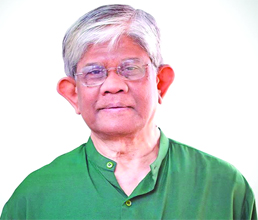Biotech key to food security: Finance Adviser

Staff reporter :
Stressing the urgent need for scientific innovation to secure Bangladesh’s food future, Finance Adviser Salehuddin Ahmed today emphasized the pivotal role of biotechnology in strengthening the country’s agricultural economy.
“Without advancing biotechnology, Bangladesh cannot move forward. It is one of the most vital branches of modern science, particularly for ensuring food security for our growing population,” he said, highlighting the sector’s strategic importance.
Praising the contributions of the nation’s agricultural scientists, Ahmed remarked, “When our population was 75 million, we faced challenges in food production. Today, with over 170 million people, we are self-sufficient in many areas. This is a testament to our scientists’ work in rice, fisheries, and livestock development.”
The adviser made these remarks at the closing session of the International Conference on Biotechnology in Health and Agriculture, organized by the Global Network of Bangladeshi Biotechnologists at Sher-e-Bangla Agricultural University in Dhaka.
However, Ahmed expressed concern about the suboptimal utilization of research funds.
“Even limited resources are often not used effectively. Many researchers focus on publications or multiple postdoctoral opportunities abroad rather than addressing pressing domestic challenges.”
He stressed the need for stronger collaboration among scientists, policymakers, and communities. “Research must go beyond laboratories and journals. It must be communicated in ways that the public and decision-makers can grasp. Only then can we achieve real-world impact.”
Addressing the issue of brain drain, Ahmed noted that over half of scholarship recipients do not return to Bangladesh.
“While seeking better opportunities is understandable, a stronger commitment to national development is essential.”
To foster innovation, he proposed establishing a national platform linking scientists, policymakers, and end-users. “Institutions like the Ministry of Science and Technology or the Institute of Biotechnology could lead this initiative. I will personally support it.”
He also criticized bureaucratic delays affecting the National Gene Bank project, emphasizing that other countries, such as Pakistan, are progressing faster.
Citing Nobel Laureate Michael Kremer’s development innovation model, Ahmed highlighted the need to translate research into practical solutions for farmers.
In a parallel session, Professor Ahmed Abdullah Azad of Bangladesh University of Health Sciences projected that pharmaceutical exports could reach $1 billion within five years, driven by high-quality generics and biosimilars.
He urged the country to focus on producing seed clones for patented biologics like monoclonal antibodies and Fc-fusion proteins, taking advantage of TRIPS patent exemptions until 2026.
“Biosimilars offer opportunities not just for healthcare access but also for wealth creation and industrial competitiveness,” he said.
Other notable speakers included Sher-e-Bangla Agricultural University Vice Chancellor Md Abdul Latif, BRAC University Registrar Dave Dowland, and BNOBB Vice President Haseena Khan.
